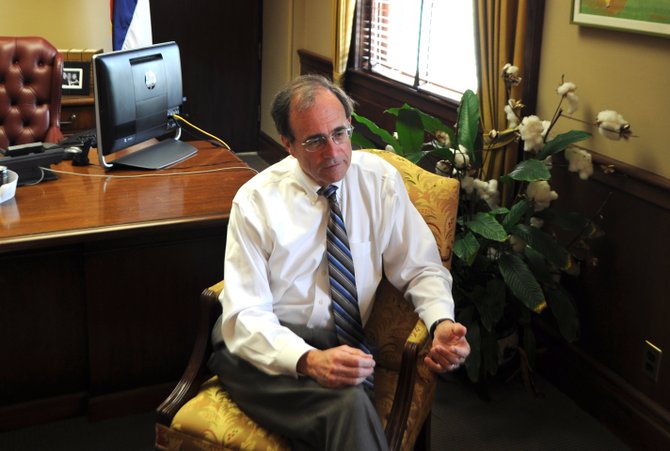Mississippi Secretary of State of Delbert Hosemann's office is launching a publicity blitz to bring attention to the state's voter-identification law that's scheduled to be used for the first time for the June 2014 primaries. Photo by Trip Burns.
Despite opposition from Democratic-leaning groups who say laws requiring voter ID could keep minorities, young people and college students away from polls, Mississippi's voter ID law will first be tested in a hot Republican primary for one of the state's U.S. Senate seats.
Mississippi Secretary of State of Delbert Hosemann's office is launching a publicity blitz to bring attention to the state's voter-identification law that's scheduled to be used for the first time for the June 2014 primaries.
The most highly anticipated in the state, that election will pit incumbent U.S. Sen. Thad Cochran, who announced plans to seek reelection last week, against state Sen. Chris McDaniel in a proxy between the GOP's mainstream and more radical Tea Party factions. Hosemann and several other Republicans had been eyeing the seat had Cochran opted for retirement.
Of the voter ID awareness campaign, Hosemann told reporters Monday that his office is airing two 30-second TV commercials—one that started Monday and one that starts in January.
Hosemann said he and his staff also are speaking to political parties, civic clubs, religious organizations, city and county elected officials, and other groups that are in touch with local communities. He said he's asking them to help share information about the new law and to help find people who lack an acceptable form of photo ID.
"We are going to take great pains to reach everyone," Hosemann said Monday during a news conference at the Capitol.
The new law says people must show one of 10 specific types of photo ID to vote.
The first nine are a driver's license; an ID issued by any branch of Mississippi state government; a U.S. passport; a government employee ID card; a gun license; a student ID from an accredited public or private college; a U.S. military ID; a tribal photo ID; or any other photo ID issued by any branch of the federal government.
Anyone who lacks one of those types of identification can get a free state-issued voter identification card that includes a photo, name and address, Hosemann said.
The photo ID cards will be made at circuit clerks' offices in January, he said. Hosemann said the state will provide free transportation to anyone who needs a ride to a circuit clerk's office. He also said that once a person is there to get ID, the clerk will provide a free verification of birth-certificate information, if that's needed.
Mississippians approved a voter ID constitutional amendment in 2011, and legislators put the mandate into law in 2012. At that time, Mississippi and other states with a history of racial discrimination needed federal approval to alter their election laws. The Mississippi voter ID proposals were still being analyzed by the U.S. Justice Department this past summer. Then, a Supreme Court ruling in late June struck down part of the Voting Rights Act and erased the requirement for federal approval.
State law specified that any driver's license shown before voting must be "current and valid." Hosemann said Monday that at the suggestion of the U.S. Justice Department, he wrote an administrative rule that says a driver's license can be expired for up to 10 years and still be used for voting, and that the driver's license can come from any state.
Hosemann and other supporters say requiring ID will prevent people from masquerading as others to vote. But, opponents have long said that requiring photo identification could squash the constitutional rights of people who forget to obtain a required type of ID or leave it at home while trying to vote.
Mississippi Democratic Party Chairman Rickey Cole attended Hosemann's news conference Monday and said afterward that he's concerned some voters might never get the message about needing photo identification.
"I have seen political candidates spend millions of dollars advertising and after the election was over, their name ID would be less than 50 percent," Cole said. "I don't know how any effort gets 100 percent saturation out to all the people who don't have ID. There will be some who fall through the cracks, and we need to be vigilant about that before, during and after the election in June."
Cole said it's too early to say whether the Democratic Party will file a lawsuit to try to block Mississippi's voter ID law.
Mississippi lawmakers budgeted $226,000 for the secretary of state's office to educate the public about the ID law. Part of that money is being used for the TV commercials, which use the same style of self-deprecating humor that Hosemann used in his two statewide campaigns.
In the first commercial, Hosemann explains that people don't need to apply for a voter ID card if they already have an acceptable form of photo identification. In the second commercial, he lists the types of documents people could bring to a clerk's office when applying for a voter ID card.
The Associated Press contributed to this story.



Comments